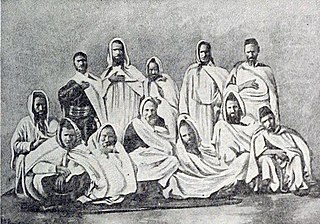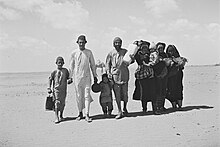Antisemitism has increased greatly in the Arab world since the beginning of the 20th century, for several reasons: the dissolution and breakdown of the Ottoman Empire and traditional Islamic society; European influence, brought about by Western imperialism and Arab Christians; Nazi propaganda and relations between Nazi Germany and the Arab world; resentment over Jewish nationalism; the rise of Arab nationalism; and the widespread proliferation of anti-Jewish and anti-Zionist conspiracy theories.
In the 20th century, approximately 900000 Jews migrated, fled, or were expelled from Muslim-majority countries throughout Africa and Asia. Primarily a consequence of the 1948 Arab–Israeli War, the mass movement mainly transpired from 1948 to the early 1970s, with one final exodus of Iranian Jews occurring shortly after the Islamic Revolution in 1979–1980. An estimated 650000 (72%) of these Jews resettled in Israel.
This article lists expulsions, refugee crises and other forms of displacement that have affected Jews.

Maghrebi Jews or North African Jews are ethnic Jews who had traditionally lived in the Maghreb region of North Africa under Arab rule during the Middle Ages. Established Jewish communities had existed in North Africa long before the arrival of Sephardi Jews, expelled from Portugal and Spain. Due to proximity, the term 'Maghrebi Jews' sometimes refers to Egyptian Jews as well, even though there are important cultural differences between the history of Egyptian and Maghrebi Jews. These Jews originating from North Africa constitute the second largest Jewish diaspora group.
Mizrahi Jews, also known as Mizrahim (מִזְרָחִים) or Mizrachi (מִזְרָחִי) and alternatively referred to as Oriental Jews or Edot HaMizrach, are a grouping of Jewish communities comprising those who remained in the Land of Israel and those who existed in diaspora throughout and around the Middle East and North Africa (MENA) from biblical times into the modern era.

Farhud was the pogrom or the "violent dispossession" that was carried out against the Jewish population of Baghdad, Iraq, on 1–2 June 1941, immediately following the British victory in the Anglo-Iraqi War. The riots occurred in a power vacuum that followed the collapse of the pro-Nazi government of Rashid Ali while the city was in a state of instability. The violence came immediately after the rapid defeat of Rashid Ali by British forces, whose earlier coup had generated a short period of national euphoria, and was fueled by allegations that Iraqi Jews had aided the British. More than 180 Jews were killed and 1,000 injured, although some non-Jewish rioters were also killed in the attempt to quell the violence. Looting of Jewish property took place and 900 Jewish homes were destroyed.
Jewish ethnic divisions refer to many distinctive communities within the world's Jewish population. Although considered a self-identifying ethnicity, there are distinct ethnic subdivisions among Jews, most of which are primarily the result of geographic branching from an originating Israelite population, mixing with local communities, and subsequent independent evolutions.
The persecution of Jews has been a major event in Jewish history, prompting shifting waves of refugees and the formation of diaspora communities. As early as 605 BCE, Jews who lived in the Neo-Babylonian Empire were persecuted and deported. Antisemitism was also practiced by the governments of many different empires and the adherents of many different religions (Christianity), and it was also widespread in many different regions of the world.
Jewish communities have existed across the Middle East and North Africa since classical antiquity. By the time of the early Muslim conquests in the seventh century, these ancient communities had been ruled by various empires and included the Babylonian, Persian, Carthaginian, Greek, Roman, Byzantine, Ottoman and Yemenite Jews.

The history of the Jews in Iraq is documented from the time of the Babylonian captivity c. 586 BCE. Iraqi Jews constitute one of the world's oldest and most historically significant Jewish communities.
Pierre Rehov is the pseudonym of a French–Israeli documentary filmmaker, director and novelist, most known for his movies about the Arab–Israeli conflict and Israeli–Palestinian conflict, its treatment in the media, and about terrorism. Rehov is also a fiction writer, whose novels have enjoyed some success in France, and several have been translated into English and German.

Berber Jews are the Jewish communities of the Maghreb, in North Africa, who historically spoke Berber languages. Between 1950 and 1970 most emigrated to France, the United States, or Israel.
Jews Indigenous to the Middle East and North Africa (JIMENA) is a non-profit organization headquartered in San Francisco, California that is dedicated to the preservation of Mizrahi and Sephardi culture and history, and seeks to educate the public and advocate for Jewish refugees from the Middle East.

The History of Jews in Qatar is relatively limited, as unlike the neighboring countries in the Gulf of Persia, there is no documented settlement of Jews in the area now known as Qatar.
In the Arab world, racism targets non-Arabs and the expat majority of the Arab states of the Persian Gulf coming from South Asian groups as well as Black, European, and Asian groups that are Muslim; non-Arab ethnic minorities such as Armenians, Africans, the Saqaliba, Southeast Asians, Jews, Kurds, and Coptic Christians, Assyrians, Persians, Turks, and other Turkic peoples, and South Asians living in Arab countries of the Middle East.
World Organization of Jews from Arab Countries (WOJAC) was an international advocacy organization, created in 1975, representing Jewish refugees from Arab countries. The World Organization of Jews from Arab Countries was created to make certain that any "just settlement of the refugee problem" recognizes those Jews who were forced to flee from lands where they had lived for centuries.
The Day to Mark the Departure and Expulsion of Jews from the Arab Countries and Iran is a National Day of Commemoration in Israel, observed every year on November 30 to memorialize the departure and expulsion of Jews from Arab countries and Iran.
A refugee crisis can refer to difficulties and dangerous situations in the reception of large groups of forcibly displaced persons. These could be either internally displaced, refugees, asylum seekers or any other huge groups of migrants.
Henry Alan Green is a Professor of Religious Studies at the University of Miami, and has taught there since 1984. After completing postgraduate work at the Hebrew University of Jerusalem, the University of Oxford, and the Sorbonne, he received his Ph.D. in Religion from St. Andrew's University in 1982. He is the published author or co-author of four books and numerous articles, and has received recognition for his work on documenting the exodus of Jews from Arab countries after the Second World War.






